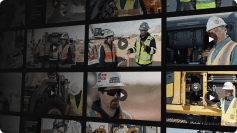How to Succeed Even When You Have No Guidance
Written by Jocko Willink
December 30, 2021
When you’re early on in your Dirt World career or you’ve just moved into a new role, there’s always a lot to learn. But what happens when no one’s there to teach you?
Or maybe the person who is there to teach you—who maybe is even supposed to teach you—isn’t very good at it. Maybe you work for a foreman who's pretty old school. He’s been around the industry for 30 years, so he just knows stuff. He doesn't explain how to do things well and is really impatient your questions.
So you’re genuinely trying to ask, “How does this work?” You’re trying to get something done. But he's really not giving you much information in return.
Leadership expert and former Navy SEAL Jocko Willink gives his advice for succeeding at your job—even when you have no guidance.
Streamline your questions
Jocko’s first piece of advice is to streamline your questions. By that, he means spend some time identifying where you’re having problems. It’s probably not the whole job that’s giving you fits; it’s probably just one or two steps in the process.
Maybe you can muddle your way through the first half of the job, but you get hung up at the midpoint. When you identify those specific problem areas, that’s what you ask your boss about.
Jocko says, “When I go and ask my boss questions, I'm not going in there saying, “How do I do this?’ I'm going to say, ‘Hey, when I get to this point and I end up with this situation, what's the most streamlined way to get that done?’ And he gives me the answer.”
Jocko adds that if someone doesn’t want to be the best instructor, then it’s your responsibility to go do what you can and come back with more specific questions that are easy for the person to answer. That reflects well on you, because it shows that you’re learning and putting forth the effort.
Ask good questions
Have you ever heard the saying, “There are no stupid questions?”
Yeah, that’s not true.
As Jocko puts it, there are good questions . . . and there are bad ones. Bad questions are the ones that you could have answered on your own if you had invested some effort.
“I get asked this on social media. Somebody will ask me a question like, ‘How long were you in the Navy?’ or something like that. And four or five people will say, ‘Google it.’ So Google the stuff, right? Like do this check to make sure that you've put forth some effort into solving this problem, and then we can go forward,” Jocko says.
By the way, “Google it” doesn’t necessarily mean to look up the answer online. It just means figure out what you can, and then once you've done that, you can narrow it down to, “Here are two things that I really need some guidance on.”
Those two things become your good questions—and those are the ones you take to your boss.
Make your questions easy to answer
Once you identify your good questions, it’s even better if you can simplify them further. According to Jocko, it helps if you boil it down to true-or-false or multiple choice. The conversation should look something like this:
Crew member: “Do I do this, this, or this?”
Boss: “Do the third one.”
Crew member: “Okay, got it. Thank you.”
That’s it—simple and painless for everyone involved. As Jocko says, “Let's make it easy for the boss.” After all, they’ve got a lot on their plate trying to lead the crew. So if you take the initiative to make their life a little easier, they’re going to notice and appreciate it. And that’s how you invest in your career long-term.
Takeaways
When you’re on a jobsite with little to no guidance, you’re going to have to have take the initiative to succeed on your own when you can and be more effective in how you ask for guidance from your leader.
Three ways to get guidance from someone who doesn’t want to give it are:
- Streamline your questions
- Ask good questions
- Make your questions easy to answer
Do these three things, and you'll be well on your way to succeeding even with little to no guidance.














